Colt Commander
| Colt Commander | |
|---|---|
 A MK IV .45 ACP Colt Combat Commander. | |
| Type | Semi-automatic pistol |
| Place of origin | United States |
| Production history | |
| Designed | 1949 |
| Produced | 1950–present |
| Variants |
|
| Specifications | |
| Barrel length |
|
| Cartridge | |
| Action | Short recoil operation |
| Feed system | box magazine
|
The Colt Commander is a single-action, semi-automatic, magazine-fed, and recoil-operated handgun based on the John M. Browning–designed M1911. It was the first mass-produced American pistol with an aluminium alloy frame and the first Colt pistol to be chambered in 9mm Parabellum.[1]
Colt made several variations of the Commander and offered it in .45 ACP and .38 Super chamberings. Other variants followed with different degrees of factory accurizing and materials.
History
[edit]The pistol that would eventually be named the Colt Commander was Colt's Manufacturing Company's candidate in a U.S. government post–World War II trial to find a lighter replacement for the M1911 pistol that would be issued to officers. Requirements were issued in 1949 that the pistol had to be chambered for 9 mm Parabellum and could not exceed 7 inches in length or weigh more than 25 ounces.[2]
Candidates included Browning Hi-Power variants by Canada's Inglis and Belgium's Fabrique Nationale, and Smith & Wesson's S&W Model 39. Colt entered a modified version of their M1911 pistol that was chambered for 9 mm Parabellum, had an aluminum alloy frame, a short 4.25-inch barrel, and a 9-round magazine. In 1950, Colt moved their candidate into regular production. It was the first aluminum-framed large frame pistol in major production and the first Colt pistol to be originally chambered in 9 mm Parabellum. The first year's production included .45 ACP and .38 Super chamberings.[2]
In 1970, Colt introduced the all-steel "Colt Combat Commander", with an optional model in satin nickel. To differentiate between the two models, the aluminum-framed model was renamed the "Lightweight Commander".[2]
Variants
[edit]The .45 ACP "Colt Commander Gold Cup" was designed to offer competition-ready out-of-the-box performance in National Match competition. It came with one 8-round magazine plus a separate recoil spring and one 7-round magazine for wadcutter ammunition.[3]
The "Colt Combat Elite" was specialized for combat-style match shooters. The .45 ACP model comes with two 8-round magazines and the .38 Super model with two 9-round magazines.
The "C.C.O." or "Concealed Carry Officer's" pistol mated the slide and barrel assembly of the stainless-steel Commander with the shorter frame of the blued Lightweight Officer's ACP.

A limited run of the Colt Commander in 7.65mm Luger was made for export in the early 1970s.
References
[edit]- ^ Ayoob, Massad (2007). The Gun Digest Book of Combat Handgunnery. Gun Digest Books. p. 7. ISBN 978-0-89689-525-6.
- ^ a b c Ayoob, Massad (2010). Massad Ayoob's Greatest Handguns of the World. Gun Digest Books. pp. 33–44. ISBN 978-1-4402-0825-6.
- ^ Malloy, John (2011). "The Colt 1911: The First Century". In Dan Shiedler (ed.). Gun Digest 2011. Krause. pp. 108–117. ISBN 978-1-4402-1337-3.
External links
[edit]- Official Safety and Instruction Manual (PDF; archived from Colt)
